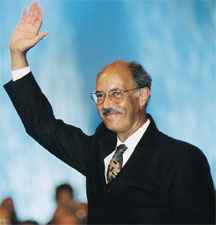our calling |
Contents: March/April 2002 |
|||
|
What does it mean to have a black president?The question I've been asked more than any other as I've traveled from congregation to congregation in my first six months as your president is not about the growth of Unitarian Universalism or our public visibility. It is not about our financial health or the Association's effectiveness in serving our congregations. It is, "How can we attract more persons of color to our church?"
Perhaps the news media are merely responding to the curiosity value of my election. But I believe a deeper and more powerful dynamic is at work. I believe that all of us — not just UUs — are hungry for hope, seeking signs that the bitter divisions of race, gender, sexual orientation, age, and ability can be bridged. I recognize this hunger in our congregations, in a wish that I could wave a magic wand and produce answers to our uncertainties. I hear it in courageous questions that let me know we are willing to change. I believe that our culture is ready for our message that life in a pluralistic community can be a blessing, for our message that differences need not divide. We UUs are far from perfect, but we raise our voices to proclaim that it is not foolish to hope. The election of an African American as president of the Association raises questions both spiritual and practical, for us and for me. What does my election mean for our faith? It doesn't mean that Unitarian Universalism has completed its work on racism. My presence in the president's office will not transform this faith. Only our commitment and work together can do that. It doesn't mean that my administration will focus only on issues of race. Justice-making is indeed a "journey toward wholeness." Our witness for religious freedom, gender justice, comprehensive sexuality education, and gay rights must continue to be heard. It doesn't mean that our congregations will automatically become welcoming sanctuaries for persons of color. Nor does it mean that our congregations should seek to acquire more persons of color so that white Unitarian Univeralists will feel better about themselves. It does mean that we have an opportunity, based on the heightened visibility caused by my election. An opportunity to deepen our alliances. An opportunity to strength- en our voice. An opportunity that we have not enjoyed in years to share our good news. This is a role I wanted, but it is not without its dangers. As the Rev. James A. Forbes Jr. said in the Ware Lecture after the votes were counted at the General Assembly in Cleveland, it's hard to be "the first." I could become one of the most visible tokens in America. Or the object of projected anxieties that surround race inside our faith community and beyond it. My commitment to you is that I will take advantage of the opportunity we have been given. My commitment to you is that I will ground my actions and my statements in the great liberal religious tradition that can be our gift to the world. In this season of rebirth, let us give thanks for this opportunity and welcome even the spiritual challenges it brings.
In faith,
To receive occasional pastoral reflections from Sinkford and other UUA-related information, subscribe to UUA-L, the low-volume e-mail list of UUA announcements. To subscribe, go to www.uua.org/lists.
UU World XVI:2 (March/April 2002): 5.
Unitarian Universalist Association25 Beacon Street, Boston, MA 02108 · Telephone (617) 742-2100 · Fax (617) 367-3237
All material copyright © 2002, Unitarian Universalist Association. There have been accesses to this page since February 15, 2002. Address of this page: http://www.uua.org/world/2002/02/calling.html |
||||

